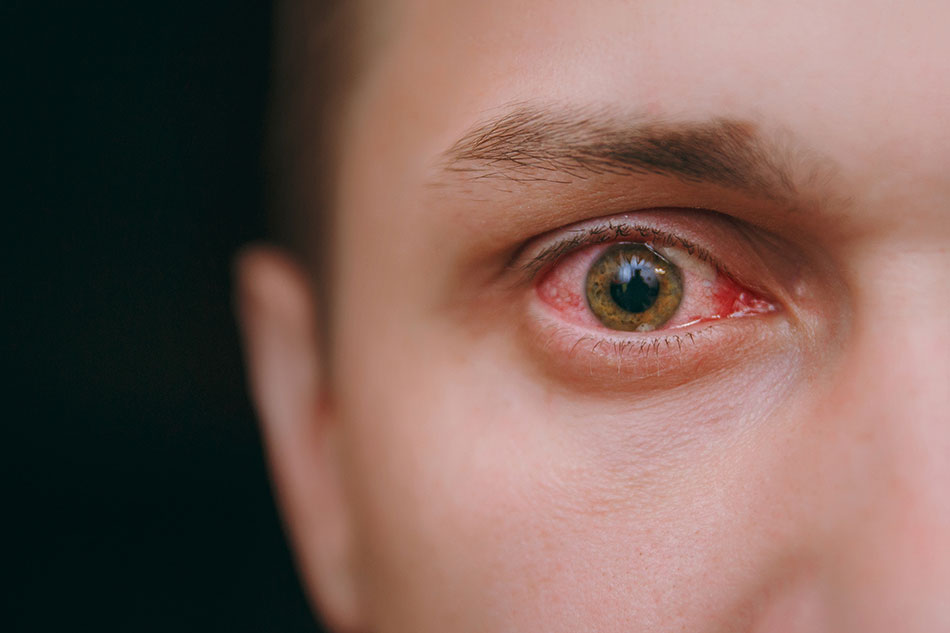Smoking does not just increase your risk of heart disease, cancer, and other diseases, but can also damage your eyes. Although some changes to your eyes, such as dry eye, can be reversed, others cause lasting, irreversible damage. Before you light your next cigarette, consider the many ways the habit can affect your vision.
Impaired Central Vision
Smoking increases your risk of developing age-related macular degeneration (AMD). The macula is the part of the retina responsible for central vision. The retina lines the back of your eye and sends impulses to the brain, which interprets them as the images you see.
When you have AMD, cells in the macula begin to deteriorate, affecting your ability to read, drive, and recognize faces. Smokers have two to three times the risk of developing AMD as non-smokers, according to a systemic review published in the online journal, “Eye.”
If you develop AMD, you may notice that:
- Words in books, magazines, or digital screens look blurry.
- Colors appear faded.
- Straight lines look wavy.
- A white spot, or a dark or blurry area, appears in the center of your vision.
- You need a brighter light for reading or close work.
Cataracts
Cataracts are a natural consequence of aging for many people, but you are twice as likely to develop them if you smoke. Cataracts cause the clear lens inside your eye to become cloudy. Your lens helps focus light images on the retina. When the lens loses its natural transparency, your vision becomes blurred. In addition to blurred vision, signs of cataracts include:
- A frequent need to change your contact lens or eyeglass prescription
- Double vision
- Faded colors
- Increased glare from lamps and headlights
- Poor night vision
Uveitis
Smoking also increases your risk of developing uveitis, an infection that can lead to blindness. Uveitis affects the middle layer of the eye and causes redness, pain, and blurred vision. Untreated uveitis can lead to optic nerve degeneration, retinal detachment, glaucoma, and cataracts. When Proctor Foundation doctors reviewed uveitis risk factors for their eye clinic patients, they discovered that smokers were 2.2 times more likely to develop uveitis than non-smokers.
Diabetic Retinopathy
Diabetic retinopathy is the leading cause of blindness and vision impairment in working age adults, according to the National Eye Institute. Smoking increases your risk of developing diabetes and may speed the progression of diabetic retinopathy.
Diabetic retinopathy occurs when blood vessels in your retina begin to leak blood or fluid. As the blood or fluid builds up in your eye, your vision becomes distorted. In the later stages of the disease, new, abnormal blood vessels begin to grow in the retina. Because these vessels cause cell loss and scarring, your vision becomes permanently impaired.
Dry Eye
Exposure to cigarette or cigar smoke can irritate and dry your eyes. Although dry eye does not usually cause lasting damage to your eyes, the condition can be very uncomfortable and can make it difficult to successfully wear contact lenses. Symptoms of dry eye include:
- Pain
- Redness
- Sensitivity to light
- Stringy discharge
- A gritty feeling in your eyes
- Itchy eyes
- Fatigue
- Blurred vision
- Difficulty reading or using the computer for long periods of time
If you smoke, regular eye examinations are a must. If it’s been a while since your last exam, give us a call.
Sometimes, it is easier to stop smoking if you have a good reason to give up the habit. If you are undecided, consider one of these three reasons.
Quitting Prevents Damage to Your Eyes
Without good vision, your whole world changes. Little things, such as driving to the store for a gallon of milk or reading a bedtime story to your children or grandchildren, become impossible. Quitting smoking will help you preserve your eyesight and allow you to continue to do the things you enjoy.
Quitting Prevents Damage to Your Pets’ Eyes
Smoking doesn’t just damage your eyes, it can also affect the health of your pets. Not only can your pets suffer from the same aliments as smokers, they also run an increased risk of nasal and oral cancers due to dogs’ sniffing habits and cats’ tedious grooming routines.
Smoking Doesn’t Just Affect You
Secondhand smoke affects your family and friends and has been linked to asthma flare ups, respiratory infections, sudden infant death syndrome, chronic cough, and frequent ear infections. If you smoke while you are pregnant, your baby may be more likely to experience optic nerve problems or crossed eyes.
Sources:
All About Vision: How Smoking Harms Your Vision
http://www.allaboutvision.com/smoking/
New York State Department of Health: Smoking Can Lead to Vision Loss or Blindness
CDC: The New Smoking Story
http://www.cdc.gov/features/smoking-eyesight/
U.S. Surgeon General: Health Consequences of Smoking – 50 Years of Progress
http://www.surgeongeneral.gov/library/reports/50-years-of-progress/exec-summary.pdf
Eye: Smoking and Age-Related Macular Degeneration
http://www.nature.com/eye/journal/v19/n9/full/6701978a.html
American Lung Association: Reasons to Quit Smoking
Ophthalmology: Cigarette Smoking as a Risk Factor for Uveitis, 3/1/11
http://www.ncbi.nlm.nih.gov/pmc/articles/PMC2830339/
National Eye Institute: Facts About Diabetic Eye Disease, 9/15
https://nei.nih.gov/health/diabetic/retinopathy
Live Science: Secondhand Smoke Causes Cancer in Pets
http://www.livescience.com/7378-secondhand-smoke-cancer-pets.html






